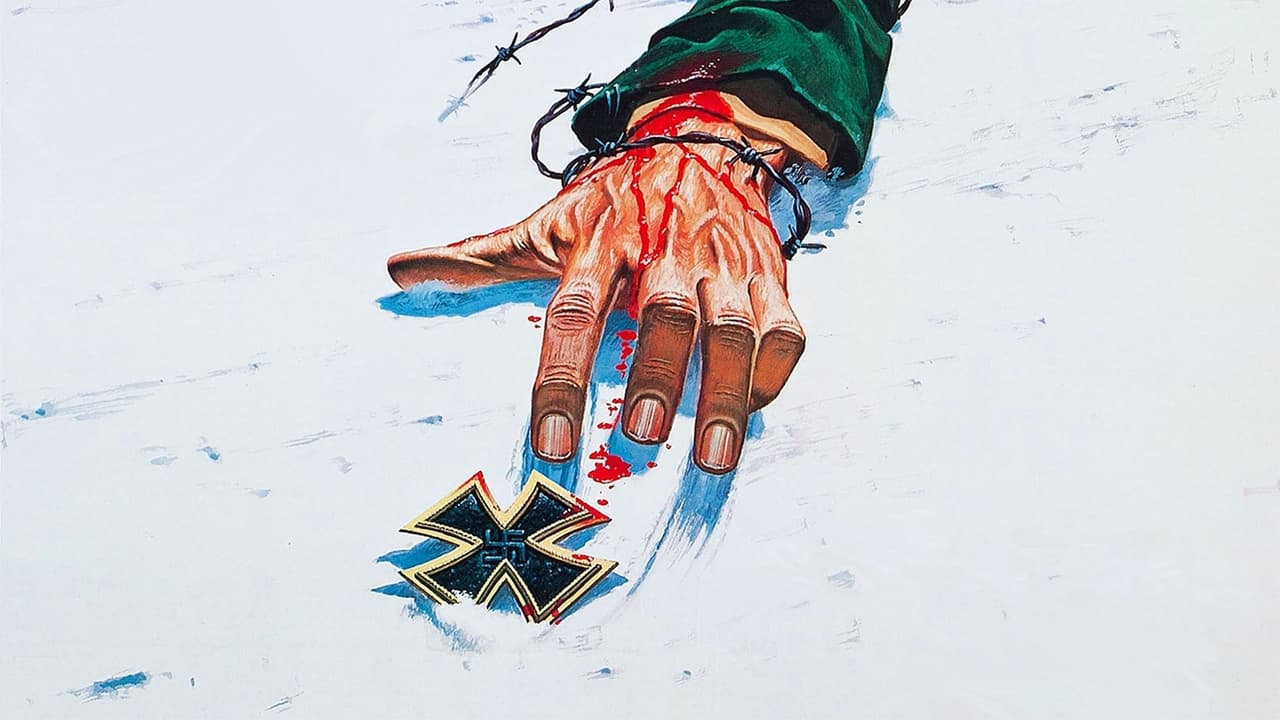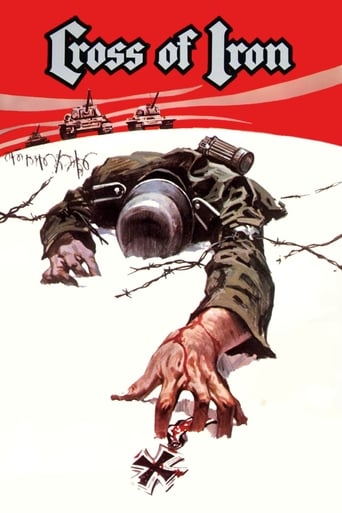

Cross Of Iron is a very good and different WW2 film that is very original and well done. This movie was'nt a big budget production by any means, but Sam Peckinpah got a lot of bang for his buck in his last great film. The film is gritty, bleak and depressing and is taken from the German soldier's point of view in the final days of battle on the Russian front. This film is mostly devoid of dogma or politics of the war, but very accurately conveys the horrors of war. James Coburn gives one of his finest performances as skilled German soldier Sgt. Steiner who is a killing machine, but hates the war and his superiors.(which mirrors Sam 's views on authority, especially producers, of which his battles are legendary) The film has excellent performers for sure with Maximillian Schell, James Mason and David Warner. The battle scenes are great and showcases a lot of Sam's signature slow motion shootouts. This is Sam Peckinpah's only war film and it is very unique and quite excellent that he comments on violence and ultra authoritarian governments. He does not beat the viewer over the head with this subtext, but the anti war message is there. Even with Peckinpah's alcohol and drug problems, he still is on the top of his game in this production and made a very memorable and effective anti war film.
... View MoreFilm Review: "Cross of Iron" (1977)From the director Sam Peckinpah (1925-1984), responsible for the outstanding western "The Wild Bunch" from the year 1969, comes this World War II movie told from the perspective of German officer Rolf Steiner, portrayed by remorseless striving perfectly-cast actor James Coburn (1928-2002), leading his platoon through the ambushing Eastern borderlands. Actor Maximilian Schell (1930-2014) as his commanding supervisor, as well as match-making cast Hauptmann Stransky, sitting in the bunker near the radio in order to direct the hopelessly front-running at the Russian frontier of year season 1942/1943. The screenplay based on a war-digesting book by Willie Heinrich (1920-2005) has been in creative hands with director Sam Peckinpah, who indulges on his trademark directions in-production with slow-motion action shots of blood and dirt-sprinkling proportions and in post-production daring editorial shot combinations that "Cross of Iron" stands out in the crowd of War movies, again a picture to be discovered with younger audiences to comprehend horrors of war and the consequences every man has to encounter in the aftermath; precisely captured by the director with the eventually consolidated main characters in battle stating final words of forfeited fighting with Stransky saying "I will show you how Prussian officers fight" in which Steiner coolly replies "And I will show you where the Iron Crosses grow."© 2017 Felix Alexander Dausend (Cinemajesty Entertainments LLC)
... View MoreAttractive sensual Eva utters ''Long live Germany''.This is the best film depicting ordinary Germans fighting for regime that has no moral ground. ''Long live Germany'' are crucial words, crucial because many Germans fought for Germany and not for Adolf Hitler, although he changed the oath not for Germany but for himself personally. Miserable Bohemian corporal had the nerve to spit on German military tradition and patriotism and destroyed the moral ground of the people, country and army. That moral bankruptcy and corruption shapes the whole atmosphere of this great film, and strife for survival of ordinary troopers becomes deeply existential drama where the only thing they are fighting for are their lives, or, when officer caste member is in question, vague sense of duty and honor shaped into piece of metal called Cross of Iron.
... View MoreSam Pekinpaugh has given us a big war-time movie situated on the Russian front, starring James Coburn as the savvy and taciturn Sgt. Steiner and Maximilian Schell as the newly arrived, dapper, Junker aristo, eager for the Iron Cross, the decoration given only for heroism in battle. It has Pekinpaugh's signature on it -- an abundance of painful deaths, more explosions than have ever before been committed to celluloid, and all in slow motion. The story is such that, if it weren't for some cogent lines, it could have been directed by Sam Fuller.I'll give one example of what I thought was a good line. At the end, both Coburn and Schell stand face to face, armed, and about to be overwhelmed and killed by the onrushing Russians. It's only a brief pause, but Schell admits his status still requires the winning of the Iron Cross. "You come with me," says Coburn, "and I'll show you where the crosses of iron are." It's neat because by a simple transposition of words within the phrase, Coburn has turned a medal (the Iron Cross) into a grave marker (crosses of iron). It has its weaknesses. It's really too long and too loose-limbed for what it has to say. As Steiner, Coburn is a monument to military perfection, while Schell is a stereotypical cowardly and spiteful traitor. Coburn does well enough by the role of the humanitarian but dedicated sergeant. Schell is a marvelous actor but he has only one scene in which he's able to put his chops on display -- when he tricks a subordinate into admitting that he prefers the company of men to women. "He said YES! He said YES!" Schell is in a transport of delight at having finagled his subordinate into a possible admission of homosexuality which, as far as we can tell, isn't true. The effect, though, is to make the subordinate a compliant slave.It's not a bad film in any way but it lacks poetry of any kind. Pekinpah by this time in his career was describing himself as "a functioning alcoholic." He's lucky he got it out at all.
... View More